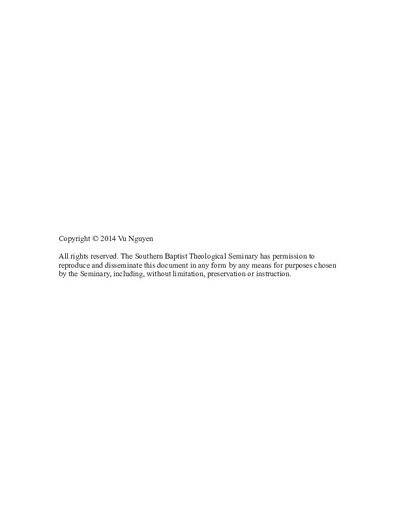Implementing an Evangelism Strategy for the First Vietnamese Baptist Church of Dalton, Georgia
Subject
Evangelistic work--Study and teachingDiscipling (Christianity)
Church growth
Vietnamese--Religious life
Asian American churches
Abstract
ABSTRACT
IMPLEMENTING AN EVANGELISM STRATEGY FOR
THE FIRST VIETNAMESE BAPTIST CHURCH
OF DALTON, GEORGIA
Vu Nguyen, D.Min.
The Southern Baptist Theological Seminary, 2014
Faculty Supervisor: An Van Pham
The project details the office of deacon as presented in Acts and 1 Timothy. The project seeks to design training processes that develop a biblical and theological understanding and deportment of church leaders in the First Vietnamese Baptist Church of Dalton. Methods include a synergistic approach to training in evangelism, character development, and leadership through service.
Chapter 1 presents the purpose, goals, context, rationale, definitions, limitations, and delimitations of the project. It describes the context of ministry for the First Vietnamese Baptist Church of Dalton and includes a history of the church and the present situation of the church. This chapter includes a detailed demographic analysis of the community of the church. It also describes the context of the ministry project, which comes from the rationale for evangelism and church growth.
Chapter 2 formulates the biblical and theological basis. It addresses the biblical and theological foundations for evangelism and church growth. Without biblical and theological foundations, the church's growth will be weak. Standing on theological truth helps church members be stronger in fighting against the schemes of Satan in the spiritual warfare for their souls.
Chapter 3 examines the scriptural principles of spiritual authority. It relates the theoretical and practical issues concerning Vietnamese history, culture, religions, and immigration to the United States as they apply to the project. This chapter describes the effective communications needed to share the gospel of Jesus Christ with Vietnamese Americans, who are often unprepared to meet God. Sound theology for cross-cultural evangelism will help church leaders improve their capability to do missions effectively.
Chapter 4 presents the curriculum and practicum administered during the course of the project. It presents the guidelines for the implementation of the project, which includes twelve weeks for training, two weeks for outreach practice, and one week for evaluation. This chapter is to be seen as a template for evangelism and church growth, which may be transferred and tailored to other small Vietnamese American communities in the United States.
Chapter 5 presents an evaluation of the effectiveness of the project. It includes the results from the participants' survey, which the author evaluated. The purpose, goals, strengths, and weaknesses of the project are presented, along with personal reflections on the project. An assessment addresses appropriate changes for improvements to this project.

